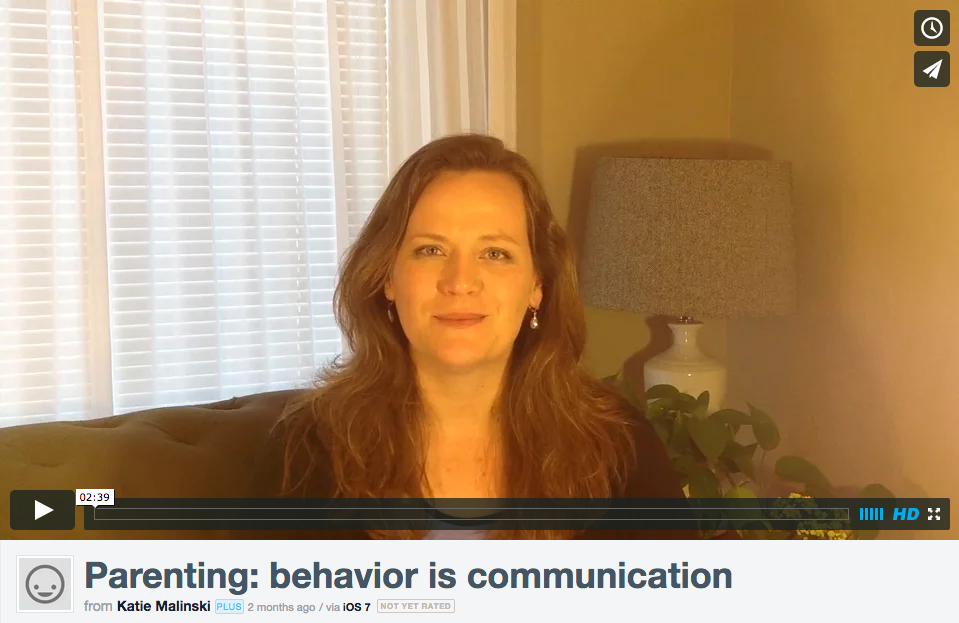Divorce-related resources on this blog
There are several articles, a video, and a webinar on this blog, created specifically to help parents through the divorce process. They are collected below for easy access. How to tell the kids When to tell the kids 7 Things kids want parents to remember Book recommendations about divorce for kids Book recommendations about divorce for parents When parents start [...]
Behavior is Communication–Video
The Arc of the Tantrum video has been hugely popular, so I've made another one. This one is on a topic I speak about in various ways all the time: Behavior is Communication. Click below for 2 minutes and 38 seconds' worth of coaching on understanding your child's misbehavior. (and see directly below for a rudimentary transcript.) Behavior is Communication, notes from [...]
The Arc of the Tantrum–video
This short video--just 3 minutes--is a little experiment in sharing information through video as opposed to written articles/blog posts. I hope you like it! Won't you tell me what you think?
Feel, Felt, Found
A mom recently shared with me a handy mnemonic that reminds you what to do when your child is having a strong emotional reaction. The process comes from the same philosophies that I follow and teach, but improves upon them by being simple and easy to remember! We know the most important thing to do when our child is upset [...]
The kids who need the most love will ask for it in the most unloving ways
I snapped a picture of this quote on the wall at the Magellan International School the other day, and posted it on Facebook. A week or so later, it had been shared by 68 people, and viewed by nearly 7000. Obviously, this quote resonates for many of us. One of the first things I tell most parents that I work [...]
Grief and loss resources on this blog
There are several articles, and one video, on this blog created specifically to help parents whose children are (or may soon be) dealing with grief and loss. They are collected below for easy reading. Children and Funerals Helping Children Grieve Book recs on grief/loss for kids Talking with children about tragedies in the news Video: Talking with young children about [...]
Wallow with them!
I love the word wallow. It's fun to say, plus it reminds me of two totally separate things: self-pity, and pigs in mud. I don’t know that I’ve ever heard the phrase used without one of those two things attached! Except, I often use the phrase at work in a way that is counter to its usual definition and negative [...]
Are you going to let her get away with that?
True personal story: When my oldest daughter was about 8 months old, she got over-stimulated and grabbed an adult relative hard enough to cause pain. We pulled her off, apologized, went into another room and helped her calm down. About 20 minutes later, I apologized for my daughter's behavior again to my relative. Her response surprised me. She said: "Are you going to let her get away with that? Shouldn't you give her a little swat on the butt?"
How to deal with a puberty-crazed teen
A reader asks: "How do you deal with a tween or teen that you know is acting badly because of puberty mood-swings? For that matter, how do you even talk to a puberty-crazed teen? They usually don't make any sense." So how do you deal with a puberty-crazed teen? Very, very carefully. ;^) Well, I’m joking there, but it’s a good serious answer, too. Here are some thoughts to keep in mind when thinking about or interacting with your teenager or pre-teen:
Talking with your kids about the Connecticut school shooting
This tragedy is so horrible I almost can't bear it. My heart hurts, and I know yours does, too. And yet, we still have to keep going, because we are our children's first protector, explainer and comforter. So take a deep breath, send some love to those families, yourself and your kids, and then you can begin to help your [...]

